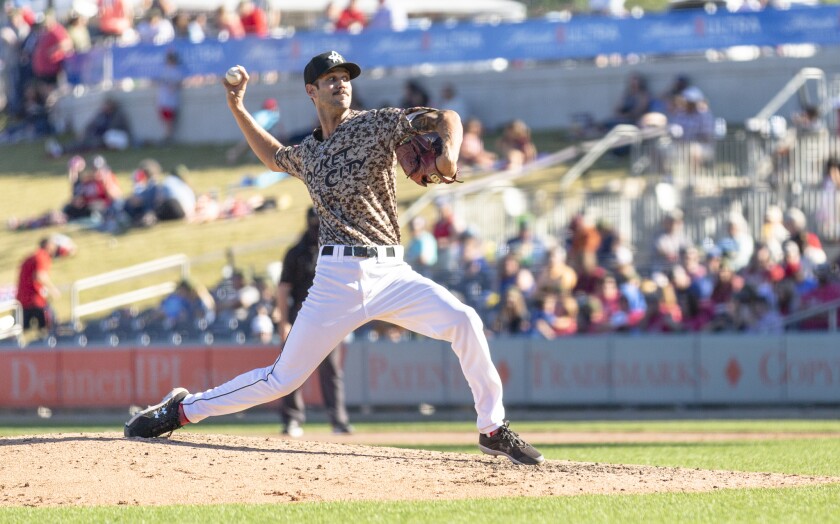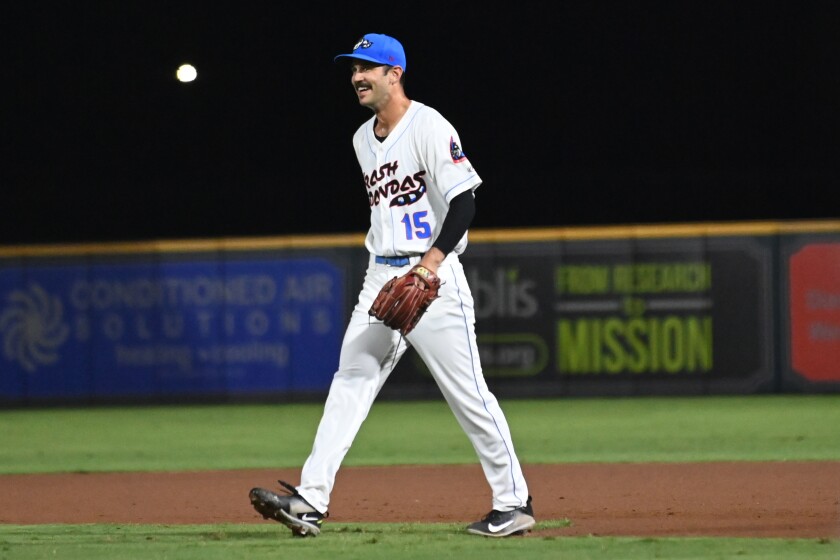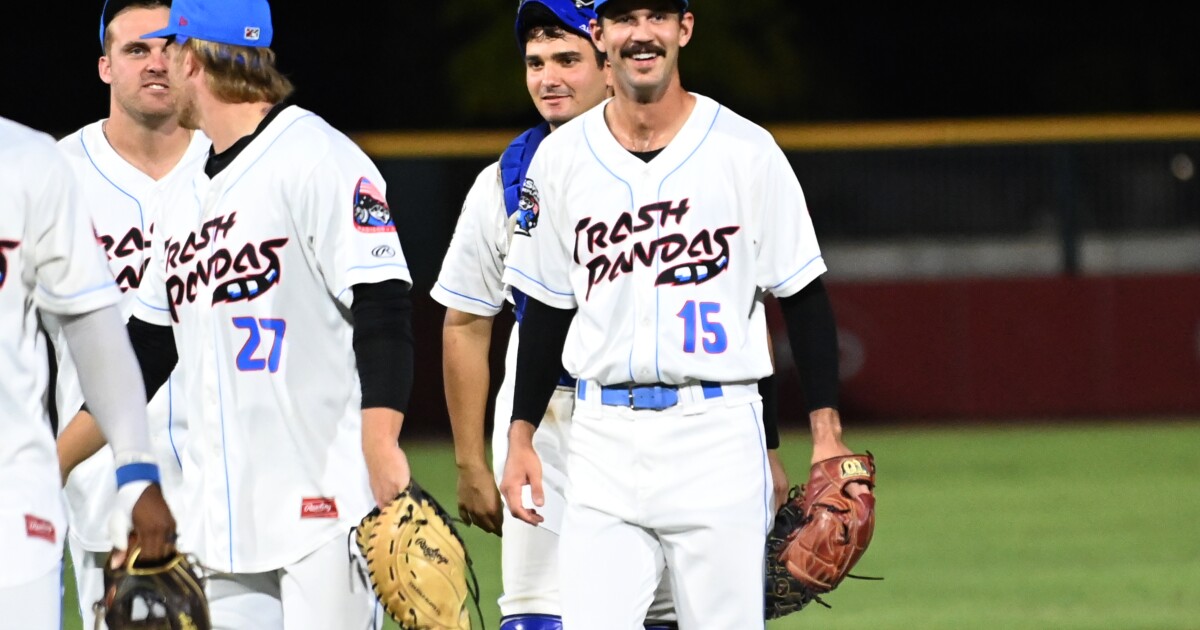One pitcher fights for a better life for fellow Angels minor leaguers. It’s working
Kieran Lovegrove’s ninth minor league season began this summer like so many others before it.
The pitcher arrived at the Angels’ double-A affiliate near Huntsville, Ala., scrambling to find a place to live — a common occurrence in minor league baseball, where players typically have to find their own in-season housing.
He saw teammates struggling to afford a nutritious diet, or sometimes even to make ends meet — a symptom of a minor league salary structure that critics claim leaves players significantly underpaid.
And he sensed the toll of such conditions weighing on the clubhouse — a looming stress and uncertainty that seemingly was present at almost every other stop in his minor-league career.
Lovegrove, 27, has never appeared in the majors since being drafted in the third round in 2012 out of Mission Viejo High. But during a near decade-long minor league career that has taken him to nine affiliates across four organizations, one thing has become increasingly clear.
“Maybe there’s something systematically wrong,” Lovegrove said recently, speaking by phone from his three-bedroom apartment that he has shared with as many as six teammates. “Maybe there’s something systematically overlooked that is causing this sort of ominous cloud that exists over minor league baseball, this deep, pervasive sadness.”
So, after a nonprofit organization called Advocates for Minor Leaguers released a report in late July that detailed alarming issues throughout the Angels’ farm system, Lovegrove decided to speak up.
In a story published by ESPN, he aired rare public critiques as an active player against his team and the minor-league system.
“The way I went about it was aggressive and controversial, at least from the internal perspective of baseball,” Lovegrove said. “However … if we had tried to handle it internally, it would have been snuffed out as it always has been.”
Only, what always has been might not be for much longer. Because, while this season might have begun like the others, Lovegrove said it is finishing with signs of change.
It began with a July statement from Angels general manager Perry Minasian, vowing the club would address the grievances. Soon after, the first tangible improvement materialized: an extra pregame meal for players across the Angels’ farm system that Lovegrove described as a small but impactful addition.
And then, this past weekend, came another encouraging development: a sit-down between Lovegrove, Minasian and Angels director of player personnel Ray Montgomery that the pitcher described as “overwhelmingly positive dialogue.”
Lovegrove and other minor-league advocates maintain such steps are only the beginning, that the Angels — like many other clubs — still have a long way to go to rectify what they believe has been years of inadequate minor league support.

(Javier Sanchez/Rocket City Trash Pandas)
They’ve called on the Angels to issue further public updates; through a spokesperson, the team declined to comment for this story. They’re still waiting for the team to address many other demands, including an improved year-round salary structure and team-provided in-season housing.
“The players getting an additional meal is a good development,” said Harry Marino, executive director of Advocates for Minor Leaguers. “But it’s far from addressing the vast majority of the concerns that we’ve raised.”
Yet, as Lovegrove prepares to enter retirement this offseason, he is feeling a newfound optimism; that finally, “we feel seen, we feel heard,” he said. “And I think that’s what a lot of guys, and especially myself, had been missing.”
***
While Lovegrove never planned on becoming a baseball activist, the sport has been ingrained in his life since he and his family moved from South Africa to Southern California when he was 5.
Lovegrove grew up going to Dodgers games, one time even getting to stand next to Paul Lo Duca for the national anthem. While starring on the mound at Mission Viejo High, he was active off the field as well, starting a charity organization with a couple teammates that donated baseball equipment to kids in need.
And after being picked by the Cleveland Indians in the third round of the 2012 draft, when he was 17, he embarked on a pro career with wide eyes and big league dreams.
“When you’re getting told, ‘You’re great, we’ll take you in the third round,’ you’re riding this wave of confidence coming in,” Lovegrove said. “Then the reality of baseball kind of slaps you in the face pretty quickly.”
For Lovegrove, the pressure of a pro career mounted quickly. He struggled during his first couple seasons in rookie ball, then suffered a couple hip injuries that derailed two seasons in low A ball.
Behind the scenes, his personal life was spiraling too. He said he developed a drinking problem and, by his fourth season, had blown through almost all of his $400,000 signing bonus, largely by spending around $1,000 a week on alcohol.
While rehabilitating after his second hip surgery in Arizona during the winter of 2015, he reached rock bottom. One night, after consuming what he now guesses were about 10 drinks, he put a gun to his head and pulled the trigger.
Nothing happened.
He realized the safety was still on.
“Without the safety being on, I wouldn’t be here,” Lovegrove said. “That small catch of reality when the trigger didn’t pull, from that point on I actually don’t remember anything that happened that night. I think I just broke down and then fell asleep on the floor.”
Lovegrove has spent the years since focusing on personal growth, mending what once felt like broken pieces in his life.
After a two-year process to achieve sobriety, he had his best season in 2018, posting a 2.73 earned-run average in 41 appearances and making his first career triple-A appearance. He also met his partner, Celina Felton, that summer while playing in Akron, Ohio.
“Without her undying support of me, I don’t know where I’d be,” he said.
While Lovegrove has never made it to the majors — his 2019 campaign was derailed after he learned he developed lupus, and the 2020 minor league season was canceled amid the pandemic — he still felt drawn to the game this past offseason, eager to play one more year before calling it a career.
So, this spring, he signed a minor league contract with the Angels, was assigned to their double-A affiliate, the Rocket City Trash Pandas, and has enjoyed being a veteran presence on what has become one of his favorite teams.
“I really lucked out that I ended up on this team,” said Lovegrove, who has a 7.20 ERA in 25 appearances. “I don’t think I could have asked for a better way to end my career.”
That’s why, when he saw teammates struggling with housing, running out of money and skimping on food — familiar ills resurfacing once again — he reached a breaking point, going public with his concerns.
“It’s probably a little idealistic to think I can prevent depression in baseball by making sure guys are eating and living well, but I certainly think it can help,” Lovegrove said, adding: “Very small changes can make a huge difference. And I think that’s largely overlooked.”
***
Lovegrove hasn’t been the only one to suffer from flaws in baseball’s development system. For years, the sport has faced significant discrepancies between the major league lifestyle and minor league experience. Crowded living spaces, lackluster nutritional options and side jobs in the offseason are nothing new.

Kieran Lovegrove was drafted in 2012 but never reached the major leagues. He plans to retire from baseball after this season.
(Cristina Byrne/Rocket City Trash Pandas)
“For a long time, the approach to the minor leagues has been, ‘No matter how poorly we treat these guys, we’re going to end up with 26 major league-caliber players. And that’s all that really matters,’ ” said Marino, whose Advocates for Minor Leaguers group was formed before last season, as the pandemic created especially extreme circumstances.
“That, at this point, is a very antiquated way of looking at the world.”
Since its founding, the advocacy group has called upon MLB to make sweeping reforms for minor leaguers who have no union and little leverage to enact change. It also has highlighted concerning conditions in many of the 30 franchises. And Marino said the stories they heard from Angels players were among some of the worst.
Following the July report and Minasian’s response, Marino said he consulted with a handful of Angels minor leaguers at each level to create a list of seven proposals for the club to improve the minor league experience — including a year-round payment structure, team-provided housing and better transportation on road trips.
Since publicizing those proposals and sending them to club executives, however, Marino said the Angels have not engaged his organization in further conversation.
“There are a number of other teams that have engaged with us in a cooperative fashion, to at least talk about some of these problems that have been publicized and possible solutions,” Marino said. “The Angels were not one of them.”
Marino, who has worked with Lovegrove to gauge player sentiment in Rocket City, said his organization remains open to discussing ideas with the Angels in the future, and was encouraged to hear about the strides the club has begun to make behind the scenes.
For Lovegrove and the Trash Pandas, the additional meal has been a meaningful but modest improvement, sometimes as simple as a catered spread from Chipotle. Whereas players used to get what Lovegrove described as a pregame snack and postgame meal every day, they now are also served a full lunch upon arriving at the ballpark. Marino said he has heard the same thing from players at other Angels affiliates.
While it might not sound like much, especially for a club estimated by Forbes to be worth more than $2 billion, “having that extra meal when you arrive really put a lot of guys at ease, instead of going out and spending $18 to $20 on a meal prior to coming to the field,” Lovegrove said.
The visit from Minasian was important too, an experience unlike anything Lovegrove had encountered.
Before then, Lovegrove hadn’t heard from team executives about his comments and wasn’t certain how serious they were about addressing the concerns.
That changed Sunday when Minasian and Montgomery — in the latest of several trips the first-year GM and other club executives have made to affiliates in recent weeks to hear from players about changes they’d like to see — had a wide-ranging talk with Lovegrove before addressing the entire Trash Pandas team.
“There is excitement among the players that things are happening,” Lovegrove said. “I want to make sure that moving forward, we’re fostering a positive relationship between the players, the front offices and eventually the owners as well. I don’t necessarily think that it should be us versus them. I think it’s everybody versus the problems. And that’s where we’re getting.”
Really, it’s the next step for franchises across the sport. The flaws currently plaguing minor-league baseball at this point have been well-documented. The speed at which clubs move in addressing those concerns, and the scale of changes they commit to, are the next steps in a process that Lovegrove hopes results in a transformation he’s awaited his entire career.
“I think this is the first time, at least in my lifetime, that I have seen an overwhelming positive response from just about everybody in the game,” he said. “It’s the first time I’ve felt like there is a movement, like something has finally shifted at least a little bit. The ball has inched forward at least once. And whether or not it continues to gain momentum will be seen here in the near future.”
window.fbAsyncInit = function() { FB.init({
appId : '134435029966155',
xfbml : true, version : 'v2.9' }); };
(function(d, s, id){ var js, fjs = d.getElementsByTagName(s)[0]; if (d.getElementById(id)) {return;} js = d.createElement(s); js.id = id; js.src = "https://connect.facebook.net/en_US/sdk.js"; fjs.parentNode.insertBefore(js, fjs); }(document, 'script', 'facebook-jssdk'));
For all the latest Sports News Click Here
For the latest news and updates, follow us on Google News.

